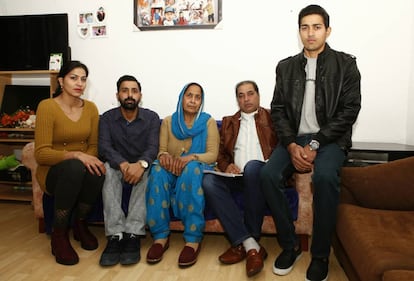How an imposter ruined the life of an Indian immigrant in Spain
Balwant Singh lost his job and residency permit after a criminal assumed his name on a failed breathalyzer test

When 59-year-old Balwant Singh, his wife and three sons moved from India to Spain, they were expecting a better life. But an unfortunate judicial and police error, which took place in Tarragona, a city in northeastern Spain, tore it apart instead. The event particularly affected the father of the family, who, after six years of working with a fixed contract and long-term residence permit in a major company in the Tarragona municipality Amposta, felt the world crash around him. And all because a stranger used his name when he was convicted for driving under the influence.
We have to start from scratch, working to pay off our debts with the people who helped us during this ordeal Singh brothers
After testing positive in the breathalyzer test, police officers summoned the fake Balwant Singh to a quick trial in the Amposta courthouse on July 31, 2009. The impostor did not even defend himself: he went to the hearing and accepted the punishment asked for by the prosecutor: two months in jail and a €600 fine.
No one bothered to take the fake Balwant’s fingerprints, and it is not clear how he managed to deceive the traffic officers during the court proceedings. While the ordeal was over quickly for the impostor, for the real Balwant Singh, it was the beginning of a nightmare that has lasted for more than six years. “We have suffered a lot, the whole family,” say his two sons, Arvinder and Harpeet, aged 19 and 25.
“My father came to Spain in 2003 and, after six years of working with a steady job, in 2009 he was granted family reunification and we came with him, my mother and my brothers, from India. We arrived very excited, to work and to be happy, and we were in the first months, we had papers, I found a job, my brother went to study, we took care of my mother, who has a pacemaker and a delicate heart ... but then everything started to go wrong,” explains Harpeet, the eldest, in perfect Spanish. Despite the fact that the father has lived in Spain longer than his family members, he has not mastered the language. “Since he has arrived by himself in Spain, he has dedicated himself solely to working and working,” explains his son.

In September 2010, Balwant asked the deputy government delegation in Tarragona to renew his long-term residence and work permit. But not only did they not renew it, they issued an order to deport him and his family from Spain for “having a criminal record.” In the files it was stated that he had committed a crime (the failed breathalyzer test) and he was given a deadline to leave the country. Balwant did not understand. He sought a private lawyer with the savings he had left and together they filed an appeal stating that he had nothing to do with the conviction. He did not have a car or a driver’s license and had never even driven before, so he could hardly have been stopped for a drink-driving test.
Balwant did not have a car or a driver’s license and had never even driven before
Their appeal was ignored. Everyone in the family had to leave Spain. He was told the only way to reverse the removal order, which seemed inevitable, was to prove that he was not the drunken driver before the Supreme Court. It is very rare for the Supreme Court to overturn a final sentence (the fake Balwant accepted the punishment, meaning the sentence was final). There had to be new and irrefutable evidence to prove that everything had been a mistake. But Balwant did not even know who the person who stole his identity was.
A series of unfortunate events followed one after the other. As money began to pour into lawyers, the youngest son had to drop out of school, Balwant lost his job (the government delegation withdrew his permit) and the eldest son could also no longer work. “We feared that the police would come at any time and deport us,” says Harpeet. Legally, no one could work. And ahead, there were even more lawsuits. Even the mother, with her fragile heart, had to start clearing fields in the area, ridding them of weeds.
“We went where they called us, sometimes only a few hours a week, without contracts, illegally, we tried to survive. It broke our spirits watching our mother, with her pacemaker, lying in the field, picking grass,” says Harvinder, the youngest of the sons, who remembers when a teacher told him that he could no longer continue his studies as a mechanic because he did not have the proper papers. The family received help from Cáritas, a Catholic relief and social service organization, and borrowed money from friends for lawsuits and to cover their basic needs. “We are honest people, we would rather go hungry than steal,” adds Harvinder.
Years passed before there was the first glimpse of hope. A judge from a nearby town arrested a Pakistani citizen as Balwant’s impersonator and found bills and false contracts he had made using Balwant’s identity. When the real Balwant saw the picture of his impersonator, he remembered that he had seen him a few times – he was a friend of an acquaintance of his. The last name Singh is very common in India. Many male followers of the Sikh religion use the name Singh (which means lion) after their first name.
We feared that the police would come at any time and deport us
Son Harpeet Singh
On August 3, 2012, Balwant started court proceedings before the Supreme Court to have the sentence overturned. He also asked the deputy government delegation to revoke the removal order in light of the new evidence. But this was refused and the authorities maintained the order to deport the whole family, reissuing it several times until 2014. Until the Supreme Court overturned the sentence, the order would remain in place, they were told. No move was made to address the judicial proceedings related to the Pakistani impersonator. But Supreme Court did take this into account. With this evidence and official proof that the signature on the public complaint did not belong to Balwant, Manuel Marchena, the president of the Criminal Chamber of the Supreme Court, ordered the guilty verdict to be thrown out on November 26, 2015.
After a six-year struggle for justice, the Singh family has finally managed to clear their record and can now work legally once again. “We have been in Spain many years and now we have to start from scratch, working to pay off our debts with the people who helped us during this ordeal; everything was very unfair, we would not wish this upon anyone,” say the brothers.
The family’s lawyer, Almuden Encinas, has presented a complaint to the Justice Ministry over the serious judicial error. She is asking for €168,000 in damages. The Judicial Council has ruled in their favor; the sentence, and everything that happened as a result, was unjust, but it is up to the ministry to determine the amount of compensation.
English version by Asia Palomba.
Family slapped with legal costs
While Balwant Singh tried to prove to the Supreme Court that he had been unjustly convicted, the deputy government delegation in Tarragona refused to withdraw the removal order against the family – even though there were already legal records showing that a Pakistani citizen had stolen Balwant's identity.
The delegation waited until February 11, 2016 – many months after the Supreme Court had tossed out the sentence against Balwant – to revoke the deportation order.
By then, the family had another lawyer, Almudena Encinas, who, before the Supreme Court annulled the sentence, tried to appeal the removal order and fines imposed on the family for not leaving Spain voluntarily. But once the family was no longer facing deportation, these appeals were no longer needed and Encinas wrote to the different courts to shelve the cases.
But the judges, before shelving the cases, slapped the Singh family with the legal costs of the process, calling for €1,600 at the request of the State Attorney. The courts said that the costs must be covered, but have reduced the amount to €100 for each lawsuit, even though they never went to trial. Encinas does not understand how the State Attorney could ask the family to pay for the cost of stopping a legal process that was started by the government delegation and came about through a legal error by the state.
Tu suscripción se está usando en otro dispositivo
¿Quieres añadir otro usuario a tu suscripción?
Si continúas leyendo en este dispositivo, no se podrá leer en el otro.
FlechaTu suscripción se está usando en otro dispositivo y solo puedes acceder a EL PAÍS desde un dispositivo a la vez.
Si quieres compartir tu cuenta, cambia tu suscripción a la modalidad Premium, así podrás añadir otro usuario. Cada uno accederá con su propia cuenta de email, lo que os permitirá personalizar vuestra experiencia en EL PAÍS.
¿Tienes una suscripción de empresa? Accede aquí para contratar más cuentas.
En el caso de no saber quién está usando tu cuenta, te recomendamos cambiar tu contraseña aquí.
Si decides continuar compartiendo tu cuenta, este mensaje se mostrará en tu dispositivo y en el de la otra persona que está usando tu cuenta de forma indefinida, afectando a tu experiencia de lectura. Puedes consultar aquí los términos y condiciones de la suscripción digital.








































